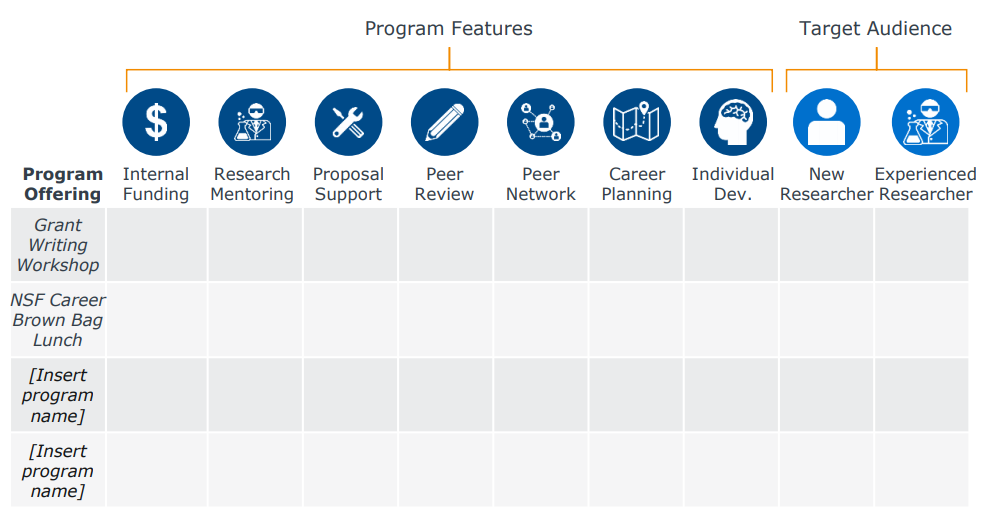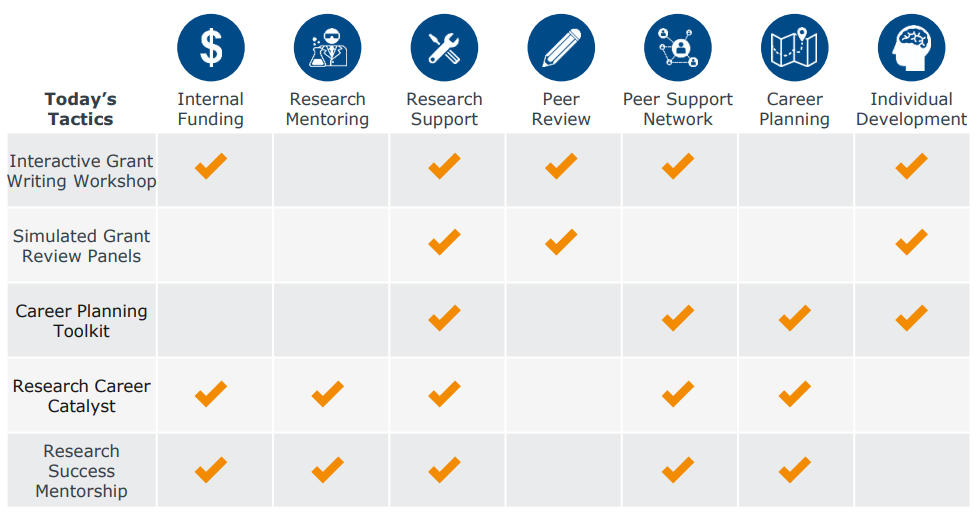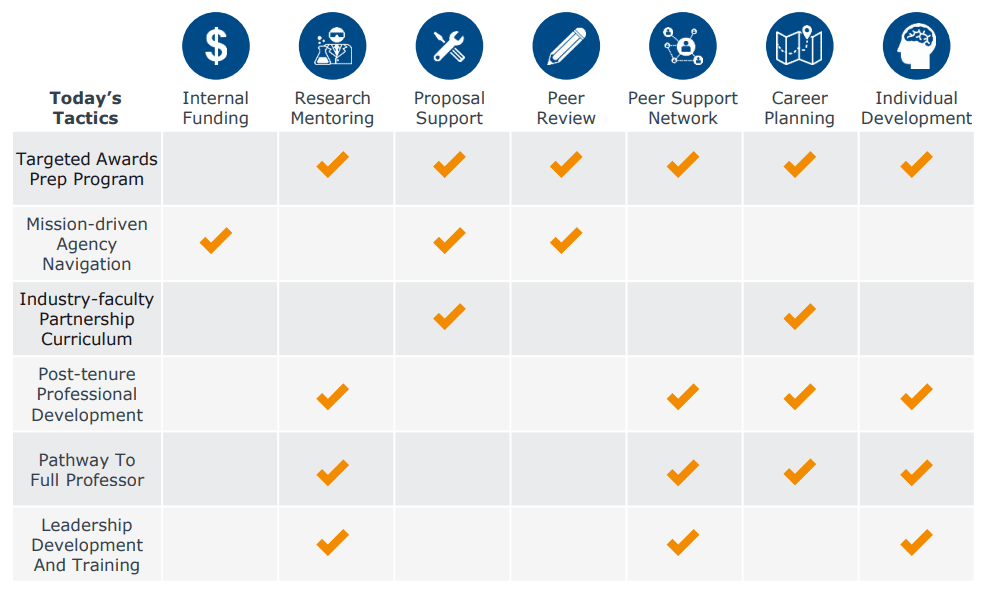Tactics to cultivate research leaders and sustain research activity
To retain faculty talent and produce quality research, university research leaders must provide professional development opportunities to faculty members throughout their careers. While early-career faculty often work under clear expectations, are protected from service obligations, and have multiple supports, faculty later on in their careers face many potential stall points.
After being awarded tenure, faculty may experience a post-tenure slump due to new teaching and service duties, a lack of clear expectations, and the time needed to ramp up new research programs. Faculty who never recover from this slump become perennial associate professors who may shift their interests due to frustration and the lack of promotion. And after age 55-60, many faculty members risk becoming disengaged, waiting for a better retirement package and worrying about life after retirement.
This resource is part of the Build a Comprehensive Faculty Research Development Program Roadmap. Access the Roadmap for stepwise guidance with additional tools and research.
Furthermore, there is little evidence that post-tenure reviews improve faculty productivity. Post-tenure reviews might happen years after a problem first occurs, and they assume the problem lies entirely with the faculty member rather than the larger organization. Administrators also have few levers to punish under-productive faculty and are rarely willing to use them—and even when they do, punitive measure usually don’t make faculty more productive.
To combat these challenges, chief research officers (CROs) should offer training and professional development to mid- to late-career faculty, train faculty on achieving promotion after tenure to ensure research productivity, and assist faculty in developing leadership skills. We’ve outlined four tactics below to help research leaders achieve these goals and transform post-tenure support.
Encourage post-tenure professional development
Related study
Discover the 10 components of successful research mentoring programs.
read the studyThe University of Denver recognized the necessity of post-tenure review to respond to public concerns and address poor performance. The board of trustees knew the effort of creating a post-tenure review system needed to be faculty-driven, so the provost worked behind the scenes to serve as liaison between the faculty senate and board. As a result of this collaborative process, the senate created a professional development program that was coupled with an annual review.
The professional development program at the University of Denver allows faculty to request financial resources to pursue external professional development annually (and funds cannot be used for conference attendance). Professional development in research, teaching, or service can also be mandated by unit heads if faculty are reviewed poorly 3 out of 5 years.
When it comes to internal professional development, tenured faculty can request formal changes in their job to represent changes in their careers. With approval, they can modify the amount of teaching, research, and service they perform. To troubleshoot issues in their job, faculty are also encouraged to engage in formal peer conversations (peers can be any other faculty member), which can count toward the conversation partner’s service load.
There are four key elements to implementing a post-tenure policy:
Faculty-led
- Faculty committee should lead the process, with input from relevant stakeholders
- Policy should be voted on by entire faculty senate
- Include easy low cost ‘wins’ such as giving service credit for conducting reviews
Supportive of growth
- Policy should encourage professional development
- Allow for changes in job role allocation
Annual specific feedback
- Policy should provide faculty with annual feedback on job performance
- Review criteria should be clear, and determined individually by each department or college
Faculty agency
- Faculty should have option to change job role allocations within certain guidelines
- There should be mechanism for faculty to rebound from poor reviews with appropriate support
Create a pathway to becoming a full professor
Many faculty members lack guidance and motivation post-tenure, as there are many barriers to attaining full professorship. Unlike achieving tenure, the path the becoming a full professor is not clear, and the process and timeline are opaque. Faculty also typically don’t have the resources and guidance to grow their careers they had pre-tenure, and growing responsiblities limit their capacity for research time.
To help faculty members avoid the post-tenure slump, CROs should help faculty plan their future careers, see full professorship as a real possibility, and understand full professor requirements.
15-20
For example, the University of New Hampshire (UNH) wanted more of their associate professors to be involved in the research necessary to achieve the rank of full professor. To achieve this goal, the office of research and the provost’s office collaborated to create an annual semester-long program to teach faculty how to become a full professor.
UNH’s program includes the workshops “Forging Your Pathway to Professorship,” “Strategies for Balancing Your Research, Teaching, and Service,” and “Looking Forward: Refining Next Steps.” The sessions are interactive, featuring reviews of successful CVs and discussions with peers, guest speakers, and successful faculty. Workshop series have 15-20 attendees per semester and are open to any associate professor. Facilitators are successful faculty as well as faculty that are on promotion and tenure committees. Ultimately, the sessions help faculty develop personal plans to attain full professor, understand what to do more and less of, and gain contacts and potential mentors in their home departments.
Benefits of UNH’s workshops for associate professors

Importance of full professor
The program has developed a sense of importance among faculty about attaining the rank of full professor, creating a tangible goal for faculty to work towards post tenure.

Service to faculty
This programming has given the CRO and provost a new way to serve faculty needs, particularly those of long serving staff members.

More faculty going up for promotion
Anecdotal evidence suggests that more faculty are going up for full promotion. However, official numbers have not been released.
Provide leadership development and training
47%
New challenges and research efforts make it necessary for faculty researchers to receive leadership training. Research leadership roles, from principal investigators to multi-institutional or international research program directors, require basic leadership skills like budgeting, team management, conflict and resolution, and diversity and inclusion.
However, current leadership trainings are largely inadequate:
- New faculty trainings cover many diverse topics, from teaching and service to research and campus logistics, but they’re primarily focused on creating new faculty citizens rather than research leaders
- New department chair trainings for mid-career faculty are focused on resource and people management and teach the “business” of departments (assigning duties, budget development, hiring, university policies, etc.), but they don’t teach these skills in the context of a lab.
- Finally, while generic leadership style trainings are geared toward all faculty and focus on leadership approaches, conflict management, and personality types, they don’t cover lab management or research development.
The University of Oklahoma approached this problem by creating a faculty leadership academy that focuses on general leadership skills for many contexts. Faculty apply to program by responding to three prompts with 300 words or less, and fellows are chosen to reflect diversity on campus. Selected faculty applicants participate in five day-long Saturday sessions across one semester. In each session, fellows are broken up into teams, with a mentor from the previous year’s class on each team, and they role play and engage in team-oriented problem solving to develop leadership skills.
Five day-long sessions held throughout a semester
1. Leadership Defined
Explores leadership theories through small group discussion and large group debrief
2. Personality and Leadership
Learn about personality traits through individual assessments and facilitated large group discussion
3. The Power of Emotions in Leadership
Develop understanding about how emotions can impact behavior by reviewing emotional intelligence model
4. The Leadership Dynamic and Leadership Agility
Take individual leadership agility assessment and learn about stages of adult development
5. Inspiring and Motivating Others Within the Leadership Dynamic
Individually assess one’s ability to motivate and inspire others through self assessment and discussion
Assess faculty research development on campus
It’s important for university research to help early-career faculty lay the foundation for an active research career, as well as support the growth of experienced researchers beyond their early years. But how does your professional development programming for faculty measure up? We’ve created diagnostics to help research leaders assess their offerings for new researchers as well as mid- to late-career faculty.

Focusing on new researchers on campus

Advancing experienced researchers

More Resources

Supporting postdocs through the cost of competition in research

Rethinking faculty data management and security in higher ed
